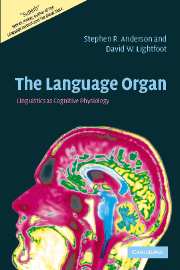Book contents
- Frontmatter
- Contents
- Preface
- 1 Studying the human language faculty
- 2 Language as a mental organ
- 3 Syntax
- 4 Sound patterns in language
- 5 Describing linguistic knowledge
- 6 Phonetics and the I-linguistics of speech
- 7 Morphology
- 8 Language change
- 9 “Growing” a language
- 10 The organic basis of language
- References
- Index
7 - Morphology
Published online by Cambridge University Press: 03 December 2009
- Frontmatter
- Contents
- Preface
- 1 Studying the human language faculty
- 2 Language as a mental organ
- 3 Syntax
- 4 Sound patterns in language
- 5 Describing linguistic knowledge
- 6 Phonetics and the I-linguistics of speech
- 7 Morphology
- 8 Language change
- 9 “Growing” a language
- 10 The organic basis of language
- References
- Index
Summary
If you ask a naive person-in-the-street – the kind of person the British call “the man on the Clapham omnibus” – what the central thing is that has to be learned in order to “know” a language, the chances are that a major part of the answer will be “the words of the language.” This notion that the words of a language are the essence of its identity is reinforced by standard language courses, which devote great attention to the systematic presentation of vocabulary. Indeed, much of what passes for “grammar” in many language courses is actually a subpart of the theory of words: what has to be learned about things like conjugation and inflection is first and foremost how to form inflected words. Compared with the effort usually devoted to drilling vocabulary and word formation, the amount of attention devoted to exemplifying the uses of the various forms and providing usage notes is usually quite limited, and the space given to fundamental matters of syntactic structure virtually none at all.
So if the set of words is such an important property of, say, English, how do we determine what that set is? A standard answer is provided by a dictionary (though that, of course, simply puts the problem off by one step: how did the dictionary makers know what to include?). Most speakers behave as if the question “Is [such and such] a word of English?).
- Type
- Chapter
- Information
- The Language OrganLinguistics as Cognitive Physiology, pp. 131 - 156Publisher: Cambridge University PressPrint publication year: 2002

